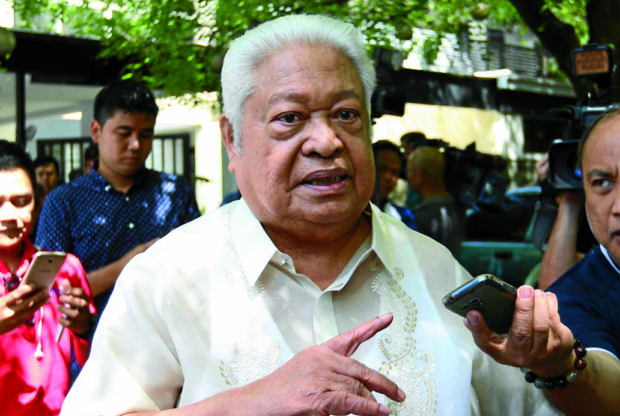
Albay Rep. Edcel Lagman. (File photo by EDWIN BACASMAS / Philippine Daily Inquirer)
As Congress leaders set the stage this year for the proposed switch to a federal system, an opposition lawmaker warned that a constituent assembly (Con-ass) would be a virtual “rubber stamp” for President Duterte.
“A strong argument, if not the strongest, against constituting the House of Representatives and the Senate into a constituent assembly is that the supermajority solons will convert the constituent assembly into a virtual rubber stamp of President Rodrigo Duterte,” Albay Rep. Edcel Lagman said on Thursday.
In a statement, Lagman, a leader of the House opposition bloc, said the planned Con-ass would principally consist of Mr. Duterte’s “dyed-in-the wool allies.”
This foreshadows a scenario in which “what the President wants as amendments or revision will be delivered with alacrity and minimal debate,” the lawmaker said.
On Wednesday, Speaker Pantaleon Alvarez and Senate President Aquilino Pimentel III said the two chambers of Congress would prioritize the proposed shift to a federal system, which would require amendments to the 1987 Constitution.
House plenary debates
During the last session of 2017 on Dec. 13, the House opened plenary debates on a measure adopting Con-ass as the mode by which the Constitution would be amended or revised to switch to a federal form of government.
The Constitution identifies three ways by which it may be changed or revised: by Congress acting as a Con-ass, by constitutional convention (Con-con) of elected delegates, or by a people’s initiative through a petition by 12 percent of the electorate.
Under a Con-ass, the Senate and the House, acting as one body, may introduce and approve changes to the Constitution by an absolute three-fourths vote and the changes are subject to a national plebiscite.
“This imprudent fast-tracking happened in the two extensions of martial law in Mindanao and the approval of the reimposition of the death penalty by the House of Representatives,” Lagman said.
Best mode
He said proposed changes to the Charter “must be approved only after serious and deliberate consideration even as the assembly authorized to propose the amendments must not be dominated by partisans of the President.”
Lagman said a Con-con was the best mode.
“Verily, a constitutional convention must be called where the delegates are elected by the sovereign people to singularly and precisely propose amendments to or revision of the 1987 Constitution,” he said.
Allies of Mr. Duterte initially pushed for Con-con as their preferred mode but changed their minds after learning it would cost the government billions of pesos.
But Lagman argued that it was not a question of expense but a matter of independence and integrity.
“We must not count centavos and pesos in undertaking Charter change by asserting that a constituent assembly is less expensive than holding a constitutional convention,” he said.
In a separate statement, former Bayan Muna Rep. Neri Colmenares said: “If the mode for amending the Constitution is the constituent assembly, it’s a foregone conclusion that President Duterte’s supermajority in Congress can craft the new Constitution according to their will.”
Centralized power
Colmenares expressed worry that transitory provisions in the new Constitution would allow Mr. Duterte to exercise legislative powers until the new Congress was convened.
“All roads lead to centralized powers for President Duterte, whether it’s martial law, revolutionary government or Charter change,” he said.
“Worse, these roads may get the support of many politicians as a result of the cancellation of the 2019 elections and the wholesale extension of terms of all government officials from the senators down to councilors,” he added. —DJ YAP